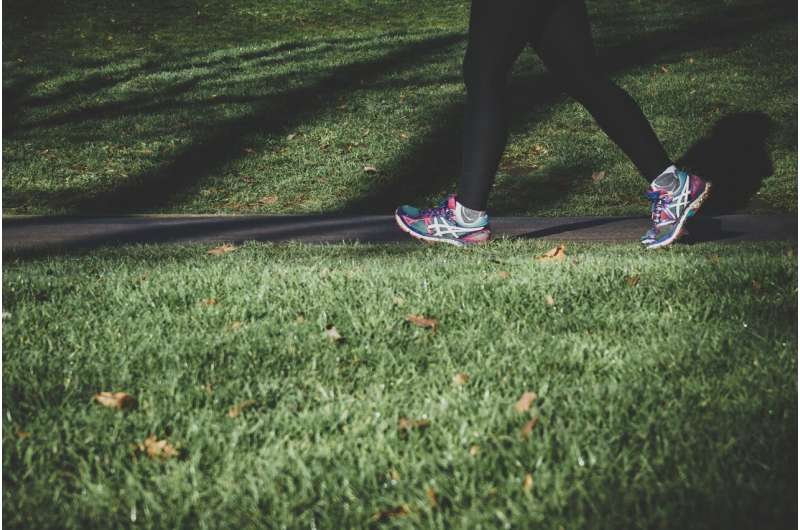
Credit: Unsplash/CC0 Public Domain
An experimental device that stimulates a key nerve connecting the heart and brain can improve fitness and exercise tolerance, according to research published in the European Heart Journal.
Using a vagus nerve stimulator for 30 minutes a day, over just one week, increased oxygen uptake during exercise, and improved other key indicators of fitness, the study found.
The team think the device, which delivers gentle electrical stimulation to increase the activity of the vagus nerve, could one day help people who are less physically active, such as those with heart failure, to exercise more, improving their overall well-being.
The vagus nerve has a crucial role in regulating heart function, but also controls other organs and systems, such as digestive and immune systems.
The study, led by researchers at University College London and Queen Mary University of London, involved 28 people who had no chronic or serious illnesses which would impact their ability to exercise. Half were randomly assigned to wear a vagus nerve stimulator for 30 minutes every day for a week, while the other group wore a dummy device. The small devices were clipped onto the outer ear.
After a two-week break, each group switched to using the other device. All participants took part in exercise testing at the beginning and end of the week that they wore the devices.
After using the vagus nerve stimulator device for seven days, participants’ oxygen uptake during exercise increased by four percent. This was accompanied by improvements in key functional exercise measures, such as their maximum breathing rate, which increased by an average of four breaths per minute, and maximum heart rate, which increased by four beats per minute during exercise. As a result, those wearing the stimulator devices were able to exercise more intensely compared to when using the dummy device.
Researchers also took blood samples from five of the participants. They found that, after using the vagus nerve stimulator for a week, compared to the dummy device, participants had less inflammation in their body, based on measurements of chemical signs of this in the blood. This suggests that, much like exercise, the use of the device can help reduce inflammation—the overreaction of the immune system to things like stress, pollution and poor diet, which can cause damage in the body over time.
Larger trials are currently ongoing to study how this form of vagus nerve stimulation could help people with heart and circulatory system diseases, such as high blood pressure and heart failure. Current research suggests that people with heart failure have a less active vagus nerve, leaving them breathless, tired, and struggling with everyday tasks. The researchers hope that this form of nerve stimulation will help people with heart failure maintain their physical activity and improve quality of life.
Professor Bryan Williams, Chief Scientific and Medical Officer at the British Heart Foundation, said, “This early study suggests that a simple technology, which harnesses the connection between the heart and the brain, can lead to improvements in fitness and exercise tolerance. While more research is needed involving people with cardiovascular disease, this could one day be used as a tool to improve well-being and quality of life for people with heart failure.”
Professor Gareth Ackland, Professor of Perioperative Medicine at Queen Mary University of London School of Medicine, who led the study, said, “Maintaining physical activity is essential for every aspect of cardiovascular, emotional, and cognitive health. The outcome of the trial is consistent with the significant body of evidence pointing to an important role of the brain in optimizing exercise performance and regulating the activity of the immune system, helped by the vagus nerve.
“We will need to carry out larger trials to confirm our findings, but the results of this study in healthy volunteers suggest that increasing vagus nerve activity can improve fitness and reduce inflammation, potentially offering new approaches to improve heart health.”
More information:
Gareth L Ackland et al, Non-invasive vagus nerve stimulation and exercise capacity in healthy volunteers: a randomized trial, European Heart Journal (2025). DOI: 10.1093/eurheartj/ehaf037 , academic.oup.com/eurheartj/art … e/46/17/1634/8023896
Provided by
British Heart Foundation
Citation:
Vagus nerve stimulation could help people get more exercise (2025, July 28)
retrieved 29 July 2025
from https://medicalxpress.com/news/2025-07-vagus-nerve-people.html
This document is subject to copyright. Apart from any fair dealing for the purpose of private study or research, no
part may be reproduced without the written permission. The content is provided for information purposes only.
